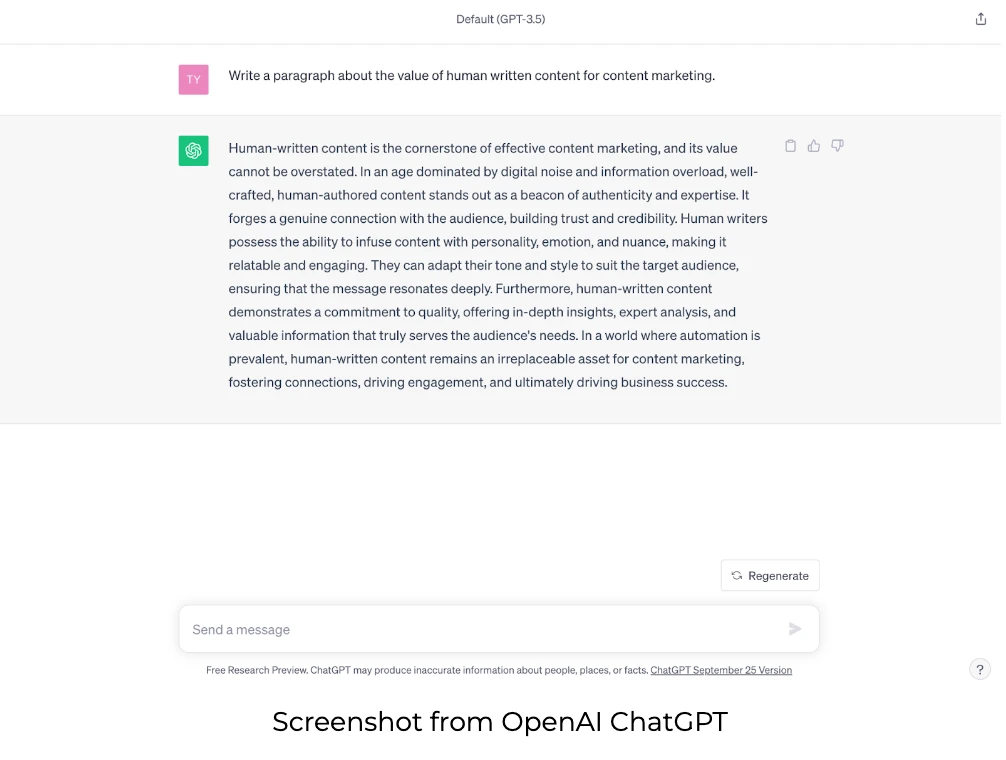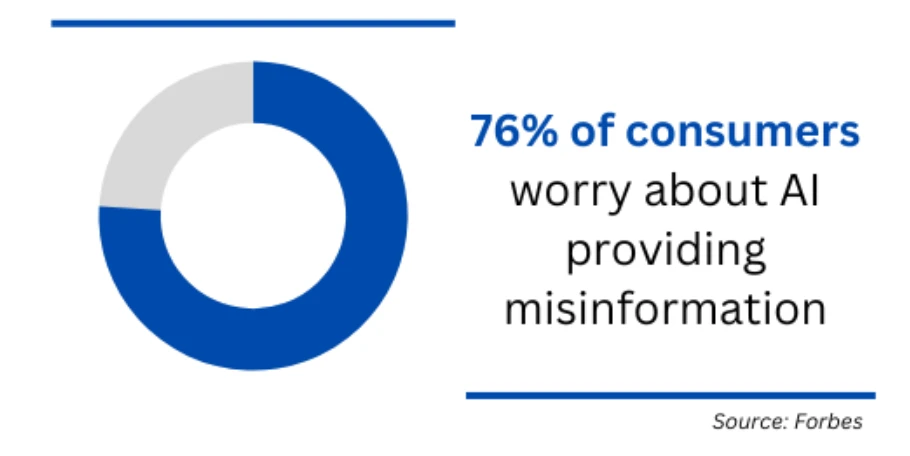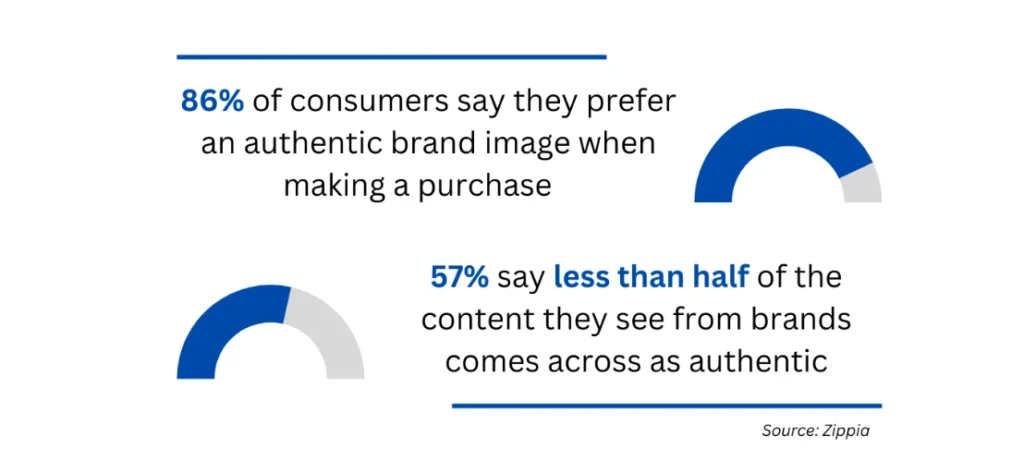Robots seem to be taking over sooner than we thought. The increasing popularity of artificial intelligence (AI) and its potential efficiency have led more and more people in the marketing world to use it, especially for content marketing. After all, content is a powerful tool when used properly, so it might sound like a great idea to churn out as much as possible.
The rise of ChatGPT and similar tools has opened up the conversation of whether marketers should switch to AI-generated content for inbound marketing materials, website copy, and content for search engine optimization (SEO). Where it stands now, it’s clear that AI can provide benefits for content marketers as a tool, but there are still several limitations that make the human element necessary for creating quality content.
- Written content generated by artificial intelligence has become a popular discussion topic for content marketers and SEO strategists.
- AI writing tools offer many benefits for generating content but still have limitations in their ability to reach audiences.
- Human-written content is better at organizing ideas, engaging readers, addressing context, and creating authentic connections.
- AI can be a helpful tool for researching and generating content, but the human touch is still a necessary part of the process.
What Are AI Writing Tools?
AI writing tools are software tools that can generate written content through the power of artificial intelligence when given user prompts. Many tools can assist you with the writing process, like editing, while several AI content generator tools can now write original content pieces.
Some of the most common AI tools include:
- ChatGPT
- Copy.AI
- Grammarly
- Jasper
- Writer
- Rytr
Some of the ways that people use AI include:
- Writing long-form blog posts
- Creating social media posts and captions
- Creating website and landing page copy
- Writing news articles
- Editing pre-existing content
How Do AI Writing Tools Work?
AI writing tools are simple to use, which is a big part of their appeal. These tools are trained using text and information from across the internet, like a large-language model, to understand existing content and generate their own content. These tools are updated regularly by developers as they’re constantly learning from interactions with users.
To use these tools, you provide a prompt or ask a question, and they will deliver an answer or a response that fits what you’re looking for. That said, you need the right prompts and wording to get your ideal response, so those who use AI tools must know how to maximize their utility. As with any marketing tool, they can still take considerable training and practice to use.

Pros and Cons of AI-Generated Content
Like most shiny new tools, AI tools and the content they create come with a few pros and cons. If you’re considering using AI-generated content as a part of your content strategy, you should know both the advantages and drawbacks of AI in order to work within them.
Some of the benefits of AI-generated content include:
- Added efficiency in the writing process
- Quicker research capabilities
- Faster content output potential
- Potential for a higher volume of content
- Additional support for brainstorming
Meanwhile, some of the drawbacks include:
- The potential for readers to pick up on the fact that content is written by AI
- Content may sound generic, dry, or lack context
- AI’s inability to capture human emotion
- The potential for misinformation or inaccurate statistics
- The need for training to use tools correctly, create effective prompts, and generate useful outputs
- The need to edit for tone and organization of AI-generated content
Of course, all tools have their pros and cons, so AI is far from completely ineffective, but it’s important to understand how to use it and what its limits are.
Benefits of Sticking to Human-Generated Content
The world is split on how successful AI-generated content can be—one survey found that 43% of people think AI-generated content can be as good as human content. Although there’s no denying that AI can be a helpful tool, we’re not at the point where AI can fully replace humans in creating content, as there are several ways it just can’t stack up.
1. A Better Reader Experience
Human-generated content provides an overall better reader experience than AI, as humans can craft more creative, original, and organized content. AI-generated content often includes awkward phrasing, bulky paragraphs, and reused content that sounds generic and bland.
Some marketers use AI to generate content, but they still have to go back to edit the phrasing of the sentences and weed out any mistakes or inaccuracies to improve how it’s presented to readers.
Because AI knowledge databases are only updated every so often, creators also need to be aware of the potential for outdated or inaccurate information when writing or editing. This is especially important as 76% of consumers worry about AI providing misinformation. All together, the editing process takes time, and it’s often more worth the effort to write it manually.

Humans are also better at organizing content effectively, as we know when too much content is too much, how many words are needed to get the point across, how to break up the text with headings, and how to vary sentence structure.
When it comes to creating original content that provides a seamless reader experience, AI just isn’t there yet. Human-generated content simply flows better.
2. More Thoughtful Strategy
A crucial purpose of writing content is to bring traffic to your website through SEO, which requires a deeper strategy than just creating the content itself. Even if AI can write some content and help you with your content planning, it’s still limited in its ability to generate ideas in context, build a nuanced content strategy and schedule, and optimize each content piece for a specific audience and purpose.
To make useful and optimized content, you need to take steps like:
- Creating content relevant to trends
- Targeting the right keywords
- Knowing which information to include
- Incorporating meaningful, real-world examples
- Using industry-related terminology
- Adjusting the voice and tone to the target audience
- Organizing content with relevant headings
AI can certainly help with some of these steps, but it’s still not a substitute for human critical thinking that can generate a content strategy to reach the right audience and demonstrate thought leadership in the context of what consumers are looking for.
3. More Authentic Connections
AI may be able to write you serviceable content, but there is a critical element it will always leave out—authenticity. Like trying a recipe that grandma didn’t make herself, AI content often seems to be missing something.
A key purpose of creating content is to establish an authoritative and authentic brand image. In fact, audiences expect authenticity from brands. Eighty-six percent of consumers say they prefer an authentic brand image and take this into account when making a purchasing decision.
However, 57% of these consumers say that less than half of the content they see from brands comes across as authentic—thoughtful human-generated content can be an integral part of building that authentic and trustworthy brand image.

Using AI to generate content makes it more difficult to maintain a unique brand voice and tone. Even if you try to prompt tools to do so, they still lack the style that makes your brand stand out, and audiences will pick up on content that isn’t unique or personal, dissolving brand trust and making consumers less likely to stick around.
Meanwhile, humans can take the time to study a brand’s voice and style while leveraging it to make content stand out and build meaningful connections.
4. Improved Engagement
Humans understand what humans are interested in better than robots can, so we’re better at writing for ourselves. AI does not fully understand how to leverage factors like sarcasm, humor, emotion, or empathy—all of which can make for great writing and better engagement.
Although AI writing tools may try, humans still have the upper hand in the following ways:
- AI tools can’t yet capture all the nuances of language or understand how to use them to make writing interesting.
- AI tools are unable to provide a personal perspective or unique insight into a topic.
- AI tools can’t form an emotional connection with readers.
Humans are also better able to adapt writing for a given purpose to improve engagement. Whether it’s content for a landing page, a social media post, or long-form blog content, humans can capture the right tone and structure for the medium and its niche audience.
Between all of these benefits, human-generated content is still more likely to resonate with a target audience, keep them engaged, and encourage them to take action for a brand.
5. Better Google Ranking Potential
The purpose of content for brands is not only to provide valuable information to consumers but also to rank well on Google using SEO strategies. Google recently updated its recommendations regarding AI, so using AI tools isn’t inherently bad for achieving your SEO goals.
Google now emphasizes that they rank quality content, no matter how it’s produced. With these updated guidelines, AI content has the potential to rank well among human-generated content.
Still, if you choose to create content using AI, you’re competing with others who are writing their content thoughtfully with the nuance needed for high ranking potential.
Some important ranking factors include:
- EEAT – Google favors content written by an expert or authority figure in the subject matter, demonstrating expertise, experience, authoritativeness, and trustworthiness.
- User readability – Google prioritizes content that is easy to read and provides a simple experience for readers with a “people first” approach.
- Relevancy – Content should be informative and relevant to the search query and intent.
- Quality of information – High-ranking content should provide interesting, detailed information and insight about a topic.
Brands are increasingly turning to AI to create more content at a faster pace. However, content rarely ranks well if it isn’t intentional. Relying on AI alone to write your content can mean sacrificing the above qualities and decreasing your chances of ranking.
Don’t Rely on AI To Write Your Content
Ultimately, you can choose to have AI write your content, but if you do, you’re going to miss out on the full potential of content creation. AI is undoubtedly a useful tool, but human-generated content is still superior for authentically and strategically reaching your target audience.
At collystring, our content is well-thought-out, strategically planned, and written by real people with authenticity and brand voice in mind. Contact us today to learn more about how high-quality, human-generated content can boost organic search traffic, establish brand authority, and maximize the potential of your leads.


